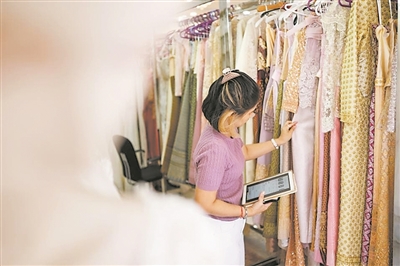Artificial Intelligence Leads the New Trend in the Fashion Industry
-

Whether using simple text-to-image models to design jewelry and clothing or employing AI to create designs based on a designer's specific style, AI has become an ally in the creative journey of designers. Image source: Forbes website.
At this year's Paris Fashion Week, supermodel Naomi Campbell, known as the "Black Pearl," wore an AI badge called Ai Pin on her lapel.
This is just a small glimpse of AI's growing influence in the fashion industry. A recent report by Forbes magazine pointed out that in the next 3 to 5 years, AI will inject $150 billion to $275 billion in profits into the apparel, fashion, and luxury industries while enhancing the sustainability and creativity of the entire sector.
Naren Barfield, Vice-Chancellor of the Royal College of Art, predicts that AI's impact on the fashion industry will be "revolutionary," spanning from conception and prototyping to manufacturing, distribution, and recycling.
Creating Personalized "Blind Boxes" for Customers
Personalization is the soul of modern retail, with 73% of customers expecting brands to understand their personal tastes and preferences. AI can play a key role in providing tailored styling for customers.
A U.S. clothing retail company is using AI to create personalized style profiles for customers and recommend outfits accordingly. Shoppers do not need to visit stores or browse online—they simply fill out a detailed form covering their height, weight, preferred style, budget, and even the frequency of their dates. Based on the questionnaire and social media insights, the company selects five pieces of clothing that best match the customer's body type and style preferences. Each month, the customer receives a "blind box" containing these items. They can try them on at home, keep what they like, and return the rest.
A research report indicates that after experiencing such personalized services, 56% of customers become repeat buyers. Customer loyalty depends on brand experience, which can be enhanced through AI.
Achieving Sustainability
The fashion industry has long been criticized for environmental issues, making sustainability a hot topic in the sector.
AI technological innovations can play a significant role in optimizing supply chains and reducing waste. For example, some apparel companies have integrated AI with RFID technology and microchip-embedded clothing tags to track products from factories to retail stores, improving operational efficiency and minimizing waste.
In the pursuit of making fashion more eco-friendly, the U.S. startup Refiberd has developed a system where old clothes are placed on an automated conveyor belt. AI-driven hyperspectral cameras scan the garments, and the data processed by AI can automatically detect the fabric composition.
Bringing Design and Creativity to Life
At this year's New York Fashion Week, designers have begun using AI image generators to create showcase outfits.
Last year, Mango launched the AI platform "Inspire," which produced over 20 clothing designs. Mango also introduced the conversational AI model Lisa. Since 2018, the brand has developed around 15 AI models for pricing and enhancing customer experiences.
The "Fashion Interactive Design Assistant" is hailed as the world's first designer-led AI system, integrating technologies like image recognition and generation. Designers can upload sketches, materials, and color palettes to the system, and the algorithm generates blueprints that designers can adjust and personalize. The system can produce over a dozen fashion templates in just 10 seconds, saving designers valuable time.
Predicting Future Trends
Professionals traditionally predict fashion trends by observing runway shows, street fashion, and pop culture. Now, AI tools can analyze various datasets, such as sales data and social media posts, to identify trends faster and more accurately.
AI platforms like Heuritech analyze millions of images shared daily on social media, providing fashion brands with the latest trend analysis to design collections that meet customer demands. Trendalytics, another platform, uses AI to analyze search data from social media and Google, helping retailers gauge the popularity of fashion trends and maximize sales.
AI-driven trend prediction is not only profitable but also promotes sustainability by avoiding the production of items that don't align with current trends.
"Virtual Try-On" Enhances Customer Experience
Google data shows that 42% of online shoppers feel uncertain when choosing products due to inadequate images, while 59% express disappointment when purchased items don't meet their expectations.
AI can improve the online shopping experience. For example, Nike's AI system scans users' feet via smartphone cameras to recommend shoe sizes, and Walmart's AI tool allows shoppers to virtually try on clothes by uploading their photos.
AI can also generate models for virtual try-ons. In March, Levi's announced the use of AI-generated models to showcase clothing. Two months later, Semir partnered with Wujie AI, integrating AI from sample design to product display.
Forbes reports that both fashion enthusiasts and designers looking to push creative boundaries should pay attention to the intricate relationship between AI and fashion. This connection not only helps them understand today's trends but also shapes the fashion of tomorrow.
